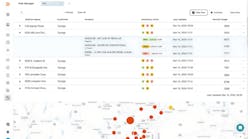National Tank Truck Carriers past president John Conley believes shale energy growth has been very good for the trucking industry, but worries that trucking — particularly in the form of unsafe drivers — could become the Achilles' heel of the shale opportunity.
While trailer orders have risen dramatically — “If you want to buy a new DOT406 or DOT407, you're probably looking at well into next year” — daily news reports about the shale boom threaten to sabotage the growth. Many of those reports paint the shale boom — and the people and companies involved in that boom — in a negative light, according to Conley, who spoke during the NTTC Tank Truck Safety & Security Council seminar held in June in New Orleans, Louisiana.
“Google the words ‘shale’ and ‘truck,’ and you'll be amazed,” he said. “Probably a third of them are from attorneys looking to represent people, but the others are news article after news article: accidents, spills, crashes, improper disposal. The attorney general of Pennsylvania is filing charges against a carrier for improper disposal of a product coming out of a shale area.
“We saw so mHe said there is no need to reinvent the safety wheel — that it's up to responsible producers and transporters to bring the same safety culture to the shale arena that has long been found in the petroleum, chemical, dry bulk, and food industries. He said established tank truck carriers know how to operate safely in all environments, and safety-conscious shippers know how to find and qualify those carriers.
“If we don't get a hold on some of the stuff I'm reading about, we will all be tarred with the same brush,” he said. “We know what the safety culture is. But what is it that we have to do to get to the producers in the field who are hiring trucking companies? We have to take our culture and bring it into this environment. We have to go out and help educate.
“What products are we taking into the field and what products are we bringing out? I know we're doing some sand and some water going in, and coming out with wastewater. Those of you in the real world have to let us know what is going in and coming out. I don't see us focusing on safety at the well site. Once somebody's on site, obviously we want them to be safe. We can certainly educate them on rollovers, which can happen in that terrain. Our main public relations effort is on the highways: going there and coming back.
“Out in the West, in Oklahoma, Texas, and the Dakotas, people grew up in the energy environment. They know that energy involves trucks. You get back here in the East in Pennsylvania, and eventually New York and Maryland, and people aren't used to all of that activity. We're seeing lot of truck traffic on small roads in Pennsylvania and West Virginia, and some of the citizens are not too happy about it.”
CSA update
Moving on to regulatory topics, Conley said NTTC has called on FMCSA to support NTTC's petition to the Pipeline and Hazardous Materials Safety Administration (PHMSA) to require all applicants for a hazmat registration number to also supply a USDOT number.
“Our belief is that there are several intrastate carriers not being included in data collection,” he said. “If you don't have a USDOT number, data picked up roadside will not go into CSA data. The problem there is the scoring in each of the BASICs is based on peers. Currently there are 19 states that don't necessarily collect that data because they don't have a DOT number for intrastate carriers.
“NTTC filed a petition with FMCSA, saying that any hazmat carrier, including a fleet operating just intrastate, that wants to get a hazmat registration number must first provide a DOT number, and they can only get that from FMCSA. So it's kind of a backdoor approach to getting data from all 50 states. The bottom line is, we would like to see data from all 50 states being used to compare hazmat carriers.”
He said NTTC has reiterated its great disappointment that FMCSA has “reneged on its commitment to the industry to fix the obvious ‘crash accountability’ problem and is now relegating that critical component to a lengthy study process.”
He said NTTC has requested that raw accident data numbers not be displayed on the public website until a process is in place for accident accountability. He said NTTC has faith that FMCSA, in determining the need for intervention, will give different weight to a “death by truck suicide” fatality and one where a driver falls asleep and rams his truck into another vehicle. He said NTTC knows that this naked number is being misused, either through intent or ignorance, by the news media, plaintiff attorneys, insurance companies, and competitors.
“It upset a lot of us when FMCSA backed away from crash accountability,” he said. “We were upset that what we had been told for a long time was coming was suddenly taken off the table. A lot of noise was made by everybody that they are putting it back on the table.”
He said he attended a recent CSA meeting that was “one of the most productive industry-government meetings” he's ever attended.
“It was surprising to me to see just how frustrated enforcement people are with FMCSA,” he said. “CVSA representatives said that while they realize the reason for CSA was to let FMCSA basically know which carriers needed intervention and attention, their feeling is that there are carriers that were never visited before that are now getting interventions. So there is pressure on people now.
“They made the point that enforcement is still doing the same things it used to do. It's just that data-collecting is different. One-third of the inspections taking place, even when targeted, have had no violations. They do see it as an enforcement challenge. They're saying, ‘We've got to make sure roadside inspectors know that anything they put in has an impact now.’ It comes down to the officer's discretion.” ♦










